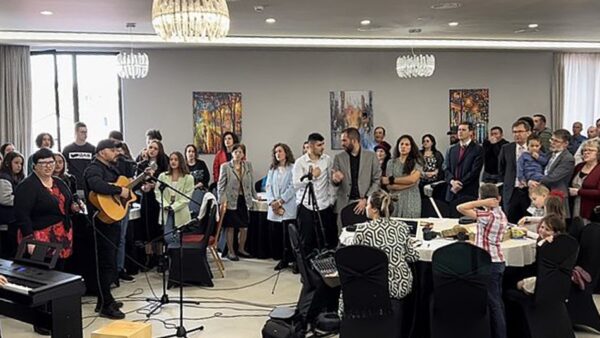Saturday (Sabbath), April 23, 2022, was a big day of celebration for the Seventh-day Adventist Church in Albania, as hundreds gathered in Tirana to praise God for the denomination’s 30th anniversary in that Eastern European nation. Leaders from the Albanian Mission and the Adriatic Union Conference were present, and many international guests joined by video conference as well.
Among the guest speakers was Audrey Andersson, executive secretary of the Trans-European Division (TED), who thanked the church in Albania for its commitment to mission and delivered the good wishes of Raafat Kamal, TED president. “We’ll soon celebrate in heaven, as Jesus is coming back soon,” Andersson said. Adriatic Union Conference officers also took time to thank church members for their commitment and resilience.
Delmar Reis, Albanian Mission president and organizer of the event, shared a glimpse into the future of the Albanian church, pointing out that much will be done in the fields of communication and mission. “We are here not only to celebrate the past but also to look into the future!” Reis said.

The celebration program included touching testimonies, inspiring songs, and heartfelt prayers. Its climax came when leaders shared a video message by former Albanian president and prime minister Sali Berisha. In his message, Berisha expressed his esteem for the Adventist Church, recalling its great work in supporting the Albanian people. “Thousands of Albanians have been helped by the Adventist Church and by the Adventist Development and Relief Agency [ADRA],” he said. Berisha, who saw the birth of the Adventist Church in Albania during his tenure, said that “Adventists are like the Good Samaritan in the Gospel,” always ready to rescue and help.
Berisha also recalled how former U.S. president Jimmy Carter, a good friend of his, repeatedly asked him to help and support the mission of Adventists in Albania. “Jimmy Carter visited Albania two times in the nineties,” he shared. “On those occasions, but also through letters that I’ve kept, he asked me to [keep] an eye out for the Adventists,” Berisha said.
Sali Berisha and Religious Liberty
Sali Berisha served as the second president of Albania from 1992 to 1997 and as prime minister from 2005 to 2013. The Albanian people hail him as a historic figure who overthrew the country’s dictatorial regime. In 2012, Berisha was commended by the Religious Liberty Association for the outstanding and exemplary level of religious liberty and the peaceful coexistence among religions in Albania. The same year, the then president of the TED, Bertil Wiklander, presented Berisha with a plaque in recognition of his unique contribution to religious liberty and the promotion of humanitarian values for the Albanian people.
The Seventh-day Adventist Church in Albania
Adventism in Albania has much older roots, reaching as far back as a hundred years ago. Albania’s Adventist martyr of faith, Daniel Lewis, a pharmacist from Boston, returned to his native Albania in the 1930s to share the Advent message in the Land of Eagles. Following World War II and the installment of a Communist regime, Lewis was imprisoned and tortured, and he died in prison because of his Scripture-based religious beliefs, including keeping the seventh-day Sabbath.
After studying the Bible with Daniel Lewis in the 1940s, Meropi Gjika accepted the Adventist message of Christian hope. When Christian churches were banished from the country by the post-World War II Communist government, Gjika endured more than four decades of religious repression. Despite having no contact with a larger Adventist community, she continued, for 46 years, to put aside tithes and offerings from her small income.
In 2001, Ray Dabrowski, then communication director of the Adventist Church, called Gjika an enduring “symbol of faith, hope, love, and obedience.”
The original version of this story was posted by the Inter-European Division.



